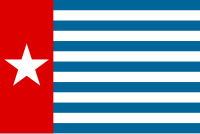Republic of West Papua

The Republic of West Papua is a separatist-proposed state that would give sovereignty to the people of Western New Guinea (the Indonesian provinces of Papua and Irian Jaya Barat). The Republic of West Papua was declared firstly after the withdrawal of the Dutch in 1963, but annexation by Indonesia halted the formulation of a government. On 1 July 1971, after by Indonesian powers of free referendum, the separatist Free Papua Movement unsuccessfully tried to proclaim Republic of West Papua again. In 1984 the Republic of West Melanesia was proclaimed, but the leaders were arrested by Indonesian authorities. Under Indonesian law, it is considered treason and punishable by death [citation needed] to fly the West Papuan flag, known as the Morning Star. According to individual supporters of a West Papuan republic on their mailing list, a system of "tribal democracy" has been proposed by elders of the Koteka Tribal Assembly Council or Demmak (Dewan Musyawarah Masyarakat Adat Koteka) and Koteka tribes. [1]
Tribal Democracy means a Free and Independent Confederation of tribes or tribal groups in West Papua. This was originally proposed by Sem Karoba, among other concepts, to the first Assembly of the Koteka Tribes in February 2000, and unanimously approved by the Koteka Elders. Demmak was then established, as a confederation of Koteka Tribes, united and organised under a General Assembly Council. Sem Karoba says, "Tribal Democracy for West Papua is not a new idea or concept at all. It is just the written explanation and presentation of the existing system of governance that already exist in West Papua since the time immemorial, practiced daily even today." Karoba just tries to
